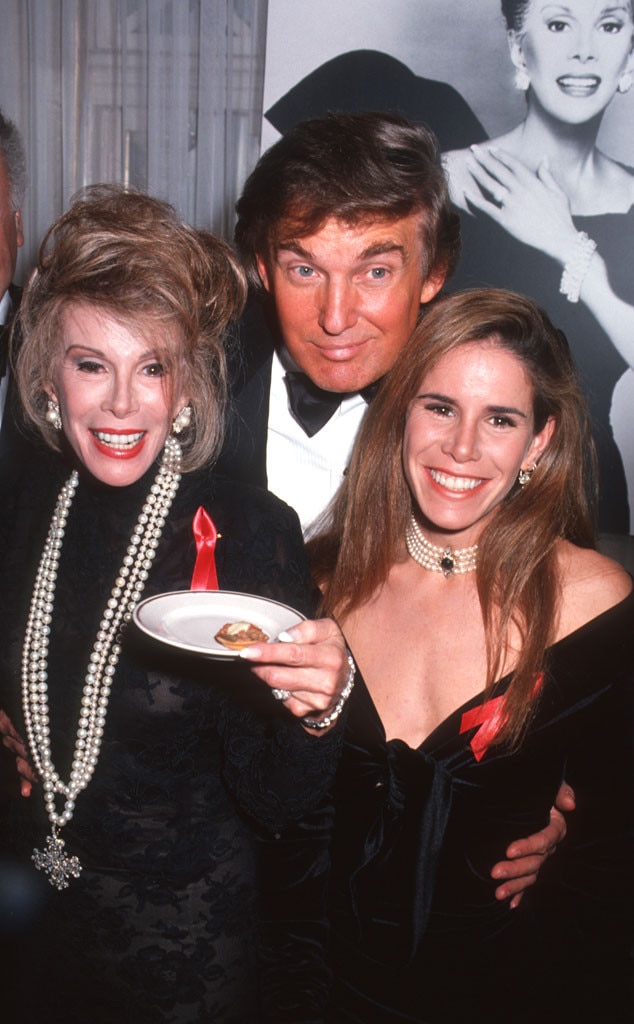Trump's Claim: Joan Rivers Voted For Him? - The Truth!
Is it possible to rewrite history, or perhaps, has someone forgotten it? Donald Trump's recent assertion that the late Joan Rivers, a comedic icon who passed away in 2014, cast a vote for him in the 2016 presidential election suggests a profound disconnect from reality. This statement, as improbable as it is, has ignited a fresh wave of controversy, raising questions about memory, truth, and the enduring legacy of a beloved entertainer.
The core of the issue lies in a simple, undeniable fact: Joan Rivers died in September 2014. This was over two years before the November 2016 presidential election, rendering her ability to vote in that election definitively impossible. Yet, former President Trump has reportedly claimed that Rivers, who had been a friend and acquaintance, supported his bid for the presidency.
This isn't the first time Trump's recollections have been called into question. His statements about various historical events and individuals have often been met with skepticism, fueled by discrepancies between his accounts and readily available facts. In this case, the discrepancy is glaring, drawing attention to a pattern of behavior that many find increasingly concerning.
The context of this particular assertion adds another layer of complexity. The comments were made in the context of interviews conducted by journalist Ramin Setoodeh, who has been documenting Trump's post-presidency life. Setoodeh's accounts, amplified by media outlets like CNN, have brought the issue to the forefront, forcing a re-evaluation of the former president's statements.
This isn't just a matter of a casual remark; it touches upon the nature of truth and the responsibility of public figures. Trump's words, regardless of their veracity, carry significant weight, particularly among his supporters. Such statements, when demonstrably false, have the potential to further erode trust in established institutions and fuel the spread of misinformation.
The incident also highlights the enduring public fascination with Joan Rivers, a woman who built a career on her sharp wit and fearless commentary. Rivers was a fixture in the entertainment industry for decades, known for her stand-up comedy, television appearances, and red-carpet interviews. Her death left a void in the world of comedy, and her name continues to resonate with audiences.
The question of Rivers's political preferences, of course, has become a subject of speculation. While she never shied away from expressing her opinions, her actual voting record remains a matter of conjecture. Her daughter, Melissa Rivers, has subtly alluded to her mother's political inclinations, hinting at a possible preference, but without explicitly endorsing any particular candidate.
The interaction between Trump and Rivers was not merely fleeting. The two crossed paths in various contexts, most notably when Melissa Rivers competed on season 8 of "Celebrity Apprentice." Joan Rivers was also involved as an advisor on the show, and these interactions undoubtedly left an impression on Trump, and the interactions also became the topic for the media.
It's a complex tapestry of memory, politics, and the lingering presence of a beloved celebrity. The incident serves as a stark reminder of the importance of verifiable facts and the need for critical evaluation in a world often saturated with information, where the line between truth and fiction can be easily blurred.
The incident, and the larger pattern it exemplifies, compels us to consider the role of memory in public discourse. How do we reconcile personal recollections with the objective record? What are the implications of misremembering or misrepresenting historical events? These are questions that transcend mere political squabbles and delve into the very fabric of truth and narrative.
As the details of this controversy continue to unfold, one thing remains clear: The late Joan Rivers, a woman who once quipped, "I succeeded by saying what everyone else is thinking," now finds herself at the center of a conversation that speaks volumes about our current political climate and the enduring power of words, even long after their speaker is gone.
| Category | Details |
|---|---|
| Full Name | Joan Alexandra Molinsky (ne Molinsky) |
| Born | June 8, 1933, Brooklyn, New York, U.S. |
| Died | September 4, 2014 (aged 81), New York City, U.S. |
| Nationality | American |
| Occupation | Comedian, Actress, Writer, Producer, Television Host |
| Years Active | 19602014 |
| Spouse | James Sanger (m. 1955; div. 1955), Edgar Rosenberg (m. 1965; his death 1987) |
| Children | Melissa Rivers |
| Known For | Stand-up comedy, red carpet interviews, The Joan Rivers Show, Fashion Police |
| Awards | Daytime Emmy Award for Outstanding Talk Show Host (2014) |


